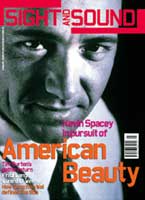Primary navigation

UK 1999
Reviewed by Xan Brooks
Our synopses give away the plot in full, including surprise twists.
London, one weekend in the lives of three sisters. Nadia is a waitress in her twenties. Her elder sister Debbie is a single mum with an 11-year-old son named Jack; her younger sister Molly is expecting a baby by her boyfriend Eddie. The barking of a neighbour's dog disturbs the sisters' mother Eileen and further strains relations with her husband Bill. Nadia meets Tim through a lonely-hearts ad and has sex with him. Eddie quits his job, quarrels with Molly and storms off.
Jack is spending the weekend with his irresponsible father Dan. Eileen feeds the neighbours' dog poisoned meat over the fence. In the adjacent block of flats, depressed Franklyn lolls in his bedroom. Molly goes into labour and is admitted to hospital, unaware Eddie has crashed his scooter and is in a nearby ward. Jack runs away from Dan and is mugged in the park. Dan, Nadia and Debbie retrieve him from the police station. Molly gives birth and is reunited with Eddie. Bill receives a message from his estranged son Darren. During her walk to work on Monday morning, Nadia meets Franklyn and they walk to the bus together.
If auteur status is defined by a directors ability to stamp a film with his or her particular visual or thematic imprimatur, then Michael Winterbottom is no auteur. His pictures run the gamut of styles and genres: hes tried the road movie (Butterfly Kiss), the period drama (Jude), a war picture (Welcome to Sarajevo) and a psycho-sexual thriller (I Want You). His brief, prolific career has established this former documentarian as a sort of Anglicised Howard Hawks, a director who adapts to shifting terrain and vigorously resists categorisation.
Peer closer, though, and Winterbottoms features all share a thematic concern with claustrophobia, their characters pinned down by circumstance. Jude is excluded from university because of his social standing. Sarajevos journalist hero finds himself kicking against a senseless war, while the entire environment of the seaside-set I Want You is a pressure-cooker. The ironically tagged Wonderland is a paean to trapped, hobbled, bleeding humanity and seems to be the fruition of this alienated thread in his work. Wonderland opens with a fumbled chat-up inside a noisy pub and closes with a tentative new beginning on the way to a bus stop. Between lies a petty hell of missed connections and humiliations. Winterbottom employs here a Chekhovian set-up (three sisters) and a limited time frame (one weekend) to anchor his free-form mosaic of London life. But Wonderlands meanderings are deceptive. What at first seem like accessory plot threads are eventually mainlined and made pivotal. In its dying minutes, the picture swells to a crescendo. Tensions are semi-resolved, emotional scabs slapped with band-aids.
The key to Wonderland lies in this twofold style, this tempering of abandon with rigorous filmic control. Think of it as Dogma-lite. Throughout the films run, Winterbottom shoots in a kind of stylised vérité. His flitting, handheld imagery is underscored by mumbled, down-in-the-mix dialogue, adorned with the occasional bit of fluff in the camera gate. But where recent, riskier pictures like Festen or The Idiots in particular operated on the very cusp of outright disorder, Wonderland plays it safe - although its documentary ambience is broken up with stylistic flourishes (time-lapse effects, slow motion). More crucially, its characters messy ebb and flow is accompanied by a swooping Michael Nyman score that plucks at the heartstrings. At times, in fact, Wonderland is almost too polished. The pristine surface (so close to adverts or modern political broadcasts) works against its red-meat interior.
That said, Wonderland contains enough soul and insight to make it a consistently bewitching experience. It flowers into life during a clutch of perfectly dealt scenes (the aftermath of the football match, the poisoning of the dog) and makes space for some compelling playing (especially from Ian Hart and Gina McKee). Meanwhile, Winterbottoms bittersweet course spirits us through a London thats positively awash with lost souls. His inhabitants go groping through noisy pubs, chill parklands and teeming hospitals in search of some intangible X factor (love, respect, reconciliation) to warm them up. Theres hope out there someplace, but you have to hunt it down.